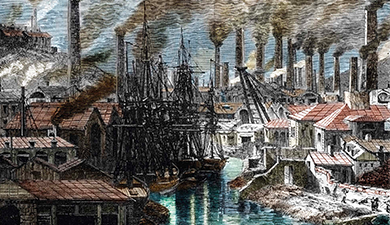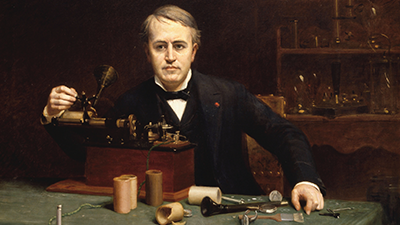Origins of Industrialization
Driving Question: How did the Industrial Revolution begin?
The Industrial Revolution started in Britain. The discovery that coal could be burned to power steam engines was nothing short of revolutionary. These new machines powered a transformation of human life on this planet that rapidly changed how we live, work, and connect to each other.
Learning Objectives:
- Evaluate how the Industrial Revolution changed human communities and societies during this era.
- Explain why industrialization started first in Britain.
- Analyze images to assess how industrialization impacted human communities.
Vocab Terms:
- debt
- fossil fuel
- industrial capitalist
- locomotion
- manufacturing
- patent
- steam engine
Opener: Origins of Industrialization
To teach this lesson step, refer to page 2 of the Lesson 5.2 Teaching Guide.
Our Openers and Closers Guide will provide more information about these short, but important, activities at the beginning and end of each lesson.
Use a painting from 200 years before the Industrial Revolution as you imagine life in a preindustrial world.
Building Cities
To teach this lesson step, refer to page 3 of the Lesson 5.2 Teaching Guide.
The Urbanization Game is a teacher and student favorite. Check out this discussion about the game the OER Project Community forum to see what it is all about!
If you’ve ever spent time in a city, you know that they’re bursting with, well, everything! Loads of buildings, people, cultures—all in one place. This game will help you explore how cities have changed our landscape—both physically and culturally.
The Industrial Revolution Begins
To teach this lesson step, refer to page 6 of the Lesson 5.2 Teaching Guide.
Check out our Reading Guide to learn about the Three-Step Reading approach.
Coal helped propel England to the forefront of industrialization. It also propelled the steam engine. These resources will help you understand how and where the Industrial Revolution started.
-
Guiding Questions
-
Before you read
Preview the questions below, and then skim the article. Be sure to look at the section headings and any images.
While you read
Look for answers to these questions:
- What was the initial reason that people in Britain started mining coal?
- How did the fact that wet conditions made British coal hard to get to turn into an advantage for Britain?
- Why did the Industrial Revolution spread out of Britain?
- What were some consequences of the Industrial Revolution?
After you read
Respond to this question: Which of the impacts of industrialization covered in this article are still apparent in today’s world?
-
Guiding Questions
-
Before you watch
Preview the questions below, and then review the transcript.
While you watch
Look for answers to these questions:
- How did coal and other environmental factors help Britain industrialize first?
- How did England’s preindustrial wool industry help it industrialize?
- How did Britain’s financial system help launch new industrial ventures?
- How might have high wages in Britain contributed to industrialization there?
- What global factors may have fed Britain’s industrialization?
After you watch
Respond to these questions: Which one factor listed in this video do you think was the most significant in helping Britain industrialize first?
During the long nineteenth century, Britain had several advantages that allowed it to industrialize first. What were they? Nick Dennis travels to England to mine for answers.
Before and After Images
To teach this lesson step, refer to page 8 of the Lesson 5.2 Teaching Guide.
Looking to differentiate, modify or adapt this assignment? Check out our Differentiation Guide.
They say a picture is worth a thousand words. Let’s test that theory in this lesson as you analyze pre- and postindustrialization images.
Images of the Industrial Revolution
Closer: Origins of Industrialization
To teach this lesson step, refer to page 9 of the Lesson 5.2 Teaching Guide.
Claim testing is really making and testing claims. This video digs into claim testing in the classroom.
Historians make a lot of claims about the Industrial Revolution. It’s time for you to practice making your own claims as you consider why industrialization started in Britain before it spread around the world.
Britain and China
To teach this lesson step, refer to page 10 of the Lesson 5.2 Teaching Guide.
In 1793, the British had nothing that China wanted. China remained at the heart of global systems of production and distribution. Yet, Britain’s growing industrialization and imperial ambitions soon shifted the balance.
-
Guiding Questions
-
Before you watch
Preview the questions below, and then review the transcript.
While you watch
Look for answers to these questions:
- Where was the economic center of the world at the end of the eighteenth century?
- Why were Europeans more interested in trade with China than the Chinese were in trade with Europe?
- What roles did European powers in the Indian Ocean (other than Britain) play in the global economy?
- Why did Lord Macartney travel to China?
- Did Macartney succeed? Why or why not?
After you watch
Respond to these questions: Based on what you know about China and Britain in 1793, which do you think would become the economic powerhouse of the nineteenth century? Why?
Industrial Innovations
To teach this lesson step, refer to page 11 of the Lesson 5.2 Teaching Guide.
Technological innovation drove industrialization. Let’s take a look at the people behind the technology that changed—and continues to change—our world.
-
Guiding Questions
-
Before you read
Preview the questions below, and then skim the article. Be sure to look at the section headings and any images.
While you read
Look for answers to these questions:
- Why was the Watt engine such an important innovation?
- What was one unexpected (and negative) impact of the cotton gin?
- How did Louis Pasteur change how we think about and treat diseases?
- Why is Thomas Edison an important inventor?
After you read
Respond to this question: Which innovation had the most important impact on human networks?
-
Guiding Questions
-
Before you watch
Preview the questions below, and then review the transcript.
While you watch
Look for answers to these questions:
- What were some of the issues with drinking water in Britain?
- What system did Thomas Hawksley pioneer?
- Why was the steam engine an essential part of making clean water?
- How did the changes in the production and distribution of drinking water impact the population of Nottingham?
After you watch
Respond to this question: What might be some long-term consequences of improved sanitation?

























